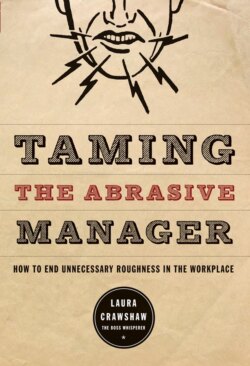Читать книгу Taming the Abrasive Manager - Laura Crawshaw - Страница 19
My Apprenticeship in Emotional Literacy
ОглавлениеRemember that my earliest lessons in suffering were taught by animals. However, my earliest lessons in reading emotions were imparted by humans and, more specifically, by my father. This should come as no surprise: if you’re the child of an auto mechanic, chances are pretty good that you’re going to learn more than the other kids on your block about how car engines work. Born to a psychoanalytically oriented psychiatrist, I grew up hearing a lot about people’s psychological workings, otherwise known as psychodynamics. My dad didn’t use that term with me—he just got me thinking about why people do what they do. For example: I was probably nine years old, sitting in a car with my dad at a stoplight, observing a disheveled man walking with a strange gait, shouting and waving his hands. ‘‘See that man over there?’’ my father asked. ‘‘He’s probably schizophrenic.’’ I somehow knew that schizophrenia meant mental illness, but I still questioned, ‘‘Couldn’t it be that he just walks funny?’’ I don’t remember my father’s exact response, but in that early interchange I was being taught that behavior has meaning and that with psychological insight one can read the underlying meanings (motivations) of behavior. This man’s behaviors were the external expressions of his internal struggle with psychosis.
These tutorials continued throughout my childhood. I have another memory of our family attending a banquet held for one of my father’s colleagues. When we got home, my father commented that the man was depressed. How could he possibly know that? The man had made no mention of depressing events or depressed feelings. When I challenged my father, he responded with a description of what I would later learn to be vegetative symptoms of depression: ‘‘Well, he’s normally talkative, but he said very little, never smiled, and hardly ate.’’ My father was able to observe and interpret this constellation of behaviors (withdrawal, flat affect, disturbed appetite) as probable indicators of depression. What an education! I was learning by observing my father’s exercise of psychological insight: the practice of reading emotions to understand behavior. Over time I gradually learned to observe behavior and do my best to accurately interpret its significance.
My education wasn’t always fun. Psychiatrists read behavior, and let me tell you, it can be pretty irritating when you’re the book they’re reading. I remember telephoning my parents during my freshman year at college to nervously declare that I would not be coming home for Christmas vacation, instead planning to go on a car trip with my newfound friends. I remember my father pausing and then announcing, ‘‘What you really mean is that you wish to separate and individuate from your parents.’’ I will be eternally grateful for my mother’s retort: ‘‘Oh, for God’s sake, Ralph. What she really means is that she just wants to be with her friends instead of her boring parents!’’ To this day I bridle whenever I hear the phrase, ‘‘What you really mean is . . . ,’’ but that’s what reading emotion is all about: deciphering the meaning behind our actions. (By the way, both parents were correct in their interpretations.)
